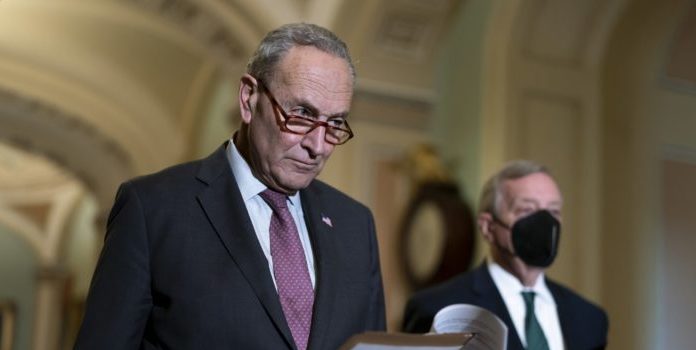(Headline USA) Despite framing their latest spending bonanza as a triump of bipartisan negotiations, Senate Democrats failed even to get three of their own party members to support it.
A 52-47 vote Tuesday blocked Democrat efforts to push the measure past a procedural hurdle and begin Senate-floor debate on the $10 billion COVID-19 compromise.
All 50 Republicans opposed the move, leaving the measure 13 votes short of the 60 needed to prevail.
RINOs, led by Sen. Mitt Romney of Utah, had touted the deal, claiming it would use existing pandemic allocations rather than dipping farther into the national coffers.
But Democrats refused to budge on renewing additional immigration protections as a Trump-era pandemic rule is due to expire on May 23, leading to an expected flood of potentially infected migrants—not to mention other national security risks.
Hours earlier, Republicans said they’d withhold crucial support for the measure unless Democrats agreed to votes on an amendment preventing President Joe Biden from lifting Title 42, a pandemic-driven policy that restricts migrants from entering the U.S.
“I think there will have to be” an amendment preserving the immigration protections “in order to move the bill” bolstering $10 billion spending bill, Senate Minority Leader Mitch McConnell, R-Ky., told reporters.
At least 10 GOP votes will be needed in the 50-50 Senate for the measure to reach the 60 votes it must have for approval. Republicans could withhold that support until Democrats permit a vote on an immigration amendment.
Biden and Senate Majority Leader Chuck Schumer, D-N.Y., want Congress to approve the pandemic bill before lawmakers leave in days for a two-week recess. Tuesday’s vote suggested that could be hard.
”This is a potentially devastating vote for every single American who was worried about the possibility of a new variant rearing its nasty head within a few months,” a fearmongering Schumer said after the vote.
White House press secretary Jen Psaki said, “Today’s Senate vote is a step backward for our ability to respond to this virus.”
However, the Biden administration has long been hammered for is disingenuous demands on US citizens, using the virus as the pretense for unprecedented attacks on civil liberties, while allowing potential health hazards to pass through the open border with impunity.
Fueled by an influx of unvaccinated migrants, the new omicron variant, BA.2, is expected to spark a fresh increase in U.S. COVID-19 cases. Around 980,000 Americans and over 6 million people worldwide have died from the disease.
The $10 billion pandemic package is far less than the $22.5 billion Biden initially sought. It also lacks $5 billion Biden wanted to battle the pandemic overseas after the two sides couldn’t agree on budget savings to pay for it, as Republicans demanded.
The push comes in spite of record-shattering, double-digit inflation that was spurred, in part, by earlier multi-trillion-dollar pandemic appropriations—of which hundreds of billions may have been lost to fraud.
Administration officials claim the government has now run out of money to finance COVID-19 testing and treatments for people without insurance, and it is running low on money for boosters, free monoclonal antibody treatments and care for people with immune system weaknesses.
That present Democrats with messy choices ahead of fall elections, when they’re expected to struggle to retain their hair-breadth House and Senate majorities.
With Biden polling poorly on his handling of immigration and Democrats divided on the issue, it could be a major vulnerability for the already beleaguered Left.
Many of the party’s lawmakers and their radical leftist supporters want the U.S. to open its doors to more immigrants. But moderates and some Democrats confronting tight November reelections worry about lifting the restrictions and alienating centrist voters.
Sen. Catherine Cortez Masto, D-Nev., who faces a competitive reelection this fall, declined to say whether she would support retaining the Trump-era ban but said more needs to be done.
“I need a plan, we need a plan,” she said in a brief interview. “There’s going to be a surge at the border. There should be a plan, and I’ve been calling for it all along.”
Shortly before Tuesday’s vote, Schumer showed no taste for exposing his party to a divisive immigration vote.
“This is a bipartisan agreement that does a whole lot of important good for the American people. Vaccines, testing, therapeutics,” he said. “It should not be held hostage for an extraneous issue.”
Jeff Zients, head of White House COVID-19 task force, expressed the same view.
“This should not be included on any funding bill,” he said of immigration. “The decision should be made by the CDC. That’s where it has been, and that’s where it belongs.”
The federal Centers for Disease Control and Prevention, which initiated the move two years ago, said earlier this month that it would lift the Title 42 ban next month, claiming the restrictions have been harder to justify as pandemic cases have eased.
But that rhetoric, ironically, contradicts the Left’s alarmism in suggesting that additional financial appropriations are necessary.
Rep. Judy Chu, D-Calif., said she supported terminating Trump’s policy and questioned GOP motives for seeking to reinstate it.
“I find it very ironic for those who haven’t wanted to have a vaccination mandate, for those who did not want to have masks in the classroom, for them to suddenly be very interested in protecting the public,” she ranted.
There is no evidence that mask and vaccine mandates have been effective in curbing the spread, although there is strong evidence that admitting infected people into the country would facilitate it.
But others on the far-Left seemed more willing to bend in the interest of compromise.
Rep. Bennie Thompson, D-Miss., chairman of the House Homeland Security Committee and the partisan Jan. 6 Committee, said he would support a Senate COVID-19 aid bill if it included the Title 42 protections.
“Why wouldn’t I?” he said in a brief interview.
Adapted from reporting by the Associated Press

